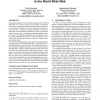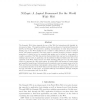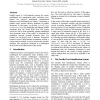341 search results - page 5 / 69 » Knowledge Retrieval and the World Wide Web |
WWW
2007
ACM
14 years 8 months ago
2007
ACM
Search queries applied to extract relevant information from the World Wide Web over a period of time may be denoted as continuous search queries. The improvement of continuous sea...
CORR
2007
Springer
13 years 7 months ago
2007
Springer
The Semantic Web drives towards the use of the Web for interacting with logically interconnected data. Through knowledge models such as Resource Description Framework (RDF), the S...
IJOE
2007
13 years 7 months ago
2007
- Since the Topic Map standard describes a prospective knowledge-structuring model that can be used in a huge variety of knowledge domains the amount of applications utilizing this...
ACSW
2004
13 years 9 months ago
2004
Parallel corpus is a rich linguistic resource for various multilingual text management tasks, including crosslingual text retrieval, multilingual computational linguistics and mul...
ICASSP
2008
IEEE
14 years 1 months ago
2008
IEEE
Most of the Web-based methods for lexicon augmenting consist in capturing global semantic features of the targeted domain in order to collect relevant documents from the Web. We s...



